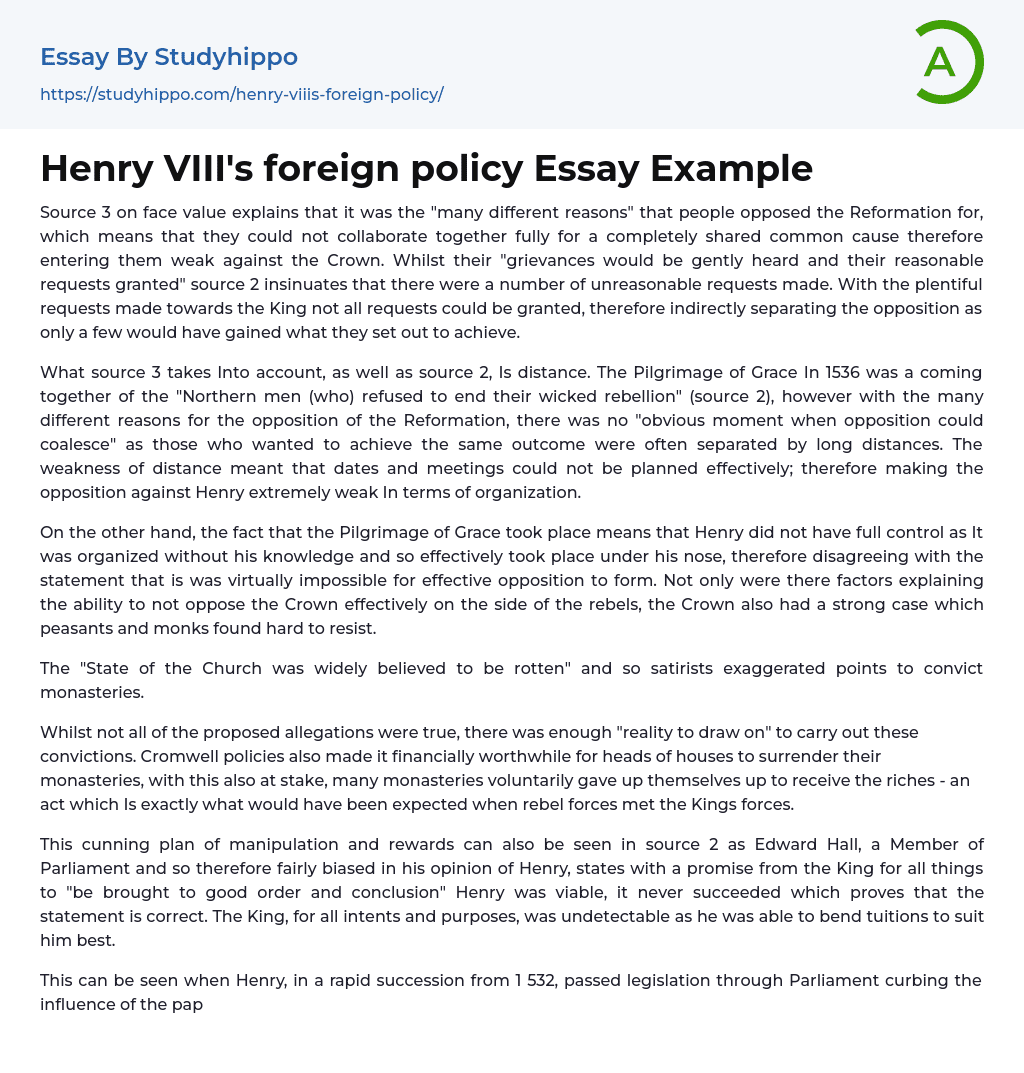Source 3 on face value explains that it was the "many different reasons" that people opposed the Reformation for, which means that they could not collaborate together fully for a completely shared common cause therefore entering them weak against the Crown. Whilst their "grievances would be gently heard and their reasonable requests granted" source 2 insinuates that there were a number of unreasonable requests made. With the plentiful requests made towards the King not all requests could be granted, therefore indirectly separating the opposition as only a few would have gained what they set out to achieve.
What source 3 takes Into account, as well as source 2, Is distance. The Pilgrimage of Grace In 1536 was a coming together of the "Northern men (who) refused to end their wicked rebellion" (source 2), however wi
...th the many different reasons for the opposition of the Reformation, there was no "obvious moment when opposition could coalesce" as those who wanted to achieve the same outcome were often separated by long distances. The weakness of distance meant that dates and meetings could not be planned effectively; therefore making the opposition against Henry extremely weak In terms of organization.
On the other hand, the fact that the Pilgrimage of Grace took place means that Henry did not have full control as It was organized without his knowledge and so effectively took place under his nose, therefore disagreeing with the statement that is was virtually impossible for effective opposition to form. Not only were there factors explaining the ability to not oppose the Crown effectively on the side of the rebels, the Crown also had a strong case which
peasants and monks found hard to resist.
The "State of the Church was widely believed to be rotten" and so satirists exaggerated points to convict monasteries.
Whilst not all of the proposed allegations were true, there was enough "reality to draw on" to carry out these convictions. Cromwell policies also made it financially worthwhile for heads of houses to surrender their monasteries, with this also at stake, many monasteries voluntarily gave up themselves up to receive the riches - an act which Is exactly what would have been expected when rebel forces met the Kings forces.
This cunning plan of manipulation and rewards can also be seen in source 2 as Edward Hall, a Member of Parliament and so therefore fairly biased in his opinion of Henry, states with a promise from the King for all things to "be brought to good order and conclusion" Henry was viable, it never succeeded which proves that the statement is correct. The King, for all intents and purposes, was undetectable as he was able to bend tuitions to suit him best.
This can be seen when Henry, in a rapid succession from 1 532, passed legislation through Parliament curbing the influence of the papacy in England and appointing himself as Supreme Head of the Church. Not only that but those who opposed King Henry in sources 1, 2 and 3 could have been charge with high treason under the Treason Act of 1534. This was an ultimate deterrent for the opposition to even think about forming as those who were charge with treason would loose all property and be killed without the chance to claim sanctuary.
- Absolutism essays
- Appeal essays
- Bourgeoisie essays
- Contras essays
- Corporate Governance essays
- Corruption essays
- Democracy essays
- Democratic Party essays
- Developed Country essays
- Dictatorship essays
- Elections essays
- European Union essays
- Federalism essays
- Foreign essays
- Foreign policy essays
- Gentrification essays
- Hillary Clinton essays
- Income Tax essays
- International Relations essays
- John Marshall essays
- John Stuart Mill essays
- Left-Wing Politics essays
- Liberty essays
- Military essays
- Monarch essays
- Monarchy essays
- Political Corruption essays
- Political Party essays
- Political Science essays
- President Of The United States essays
- Public Service essays
- Red Cross essays
- Reform essays
- Republic essays
- Revenge essays
- Social Security essays
- Sovereign State essays
- State essays
- Supply essays
- Terrorism essays
- United Nations essays
- World Trade Organization essays
- Henry v essays
- Stonehenge essays
- Victorian Era essays
- Armed Forces essays
- Confederate States Of America essays
- Federal government essays
- Federal Government Of The United States essays
- Fourteenth Amendment To The United States Constitution essays




